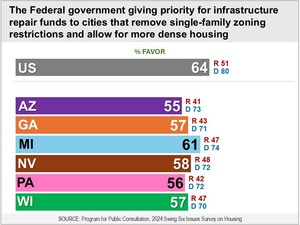Shown Budget Deficit, Bipartisan Majorities Agree on Steps to Cut It Deeply, Primarily by Raising Taxes on High Incomes
Republicans as Well as Democrats Favor Reversing 2017 Tax Cuts for Incomes Over $200K
COLLEGE PARK, Md., Aug. 1, 2019 /PRNewswire/ -- As Congress lifts the national debt ceiling, increasing the budget deficit, a unique survey conducted by the University of Maryland's Program for Public Consultation (PPC) has found that bipartisan majorities are ready to cut the deficit by $376 billion, primarily by raising taxes on high incomes. Survey participants—who were shown the current deficit, and given the opportunity to propose changes in spending and taxes—proposed reversing the 2017 tax cuts for incomes over $200,000, treating capital gains and dividends as ordinary income for those with incomes over $200,000, and applying an extra tax of 4% on income over $5 million.
In the interactive online survey, a sample of 2,403 registered voters were presented the discretionary budget (broken into 34 line items) and the budget deficit for 2019. They were given the opportunity to modify spending levels up or down, getting immediate feedback on the impact of their changes on the deficit.
While Congress is headed for increasing the defense budget, in the survey a majority cut it $51 billion (Republicans $14 billion, Democrats $101 billion). Majorities of both Republicans and Democrats cut subsidies to agricultural corporations by $7 billion and spending on federal enforcement of federal laws by $2 billion. While majorities of Republicans and Democrats made small increases to some programs, this did not extend to the majority of the whole sample. Overall, the majority made net reductions in spending of $70 billion. Republicans cut $52 billion, Democrats $111 billion, and converged on cuts of $27 billion.
The biggest deficit reductions were made when they were presented general revenue options. Respondents were able to modify current tax rates for different income brackets, and also adopt new possible sources of revenue. Overall, majorities increased revenues $474 billion: Republicans $349 billion, Democrats $552 billion.
Total deficit reduction, from changes to spending and revenue, for the overall majority was $544 billion: Republicans $401 billion, Democrats $663 billion. Bipartisan majorities overlapped on $376 billion in reductions.
"Clearly Americans from both parties are worried about the deficit and are ready to make some tough choices to bring it down—far more than Congress," said PPC Director Steven Kull.
In addition to the increased taxes on high-income individuals, major new taxes were aimed at Wall Street. Bipartisan majorities endorsed a new fee of 0.1% on financial transactions, such as the sale of stocks and a new fee of 0.15% on uninsured debt held by financial institutions.
Bipartisan majorities also endorsed an extra tax on corporate income over $100 million, raised alcohol taxes to 25 cents per ounce of alcohol and raised taxes on various tobacco products.
The survey was conducted online from April 10 - May 13, 2019 with a national probability-based sample of 2,403 registered voters, provided by Nielsen Scarborough from its sample of respondents, who were recruited by mail and telephone using a random sample of households. The margin of error is +/-2.0 percent.
Try Policymaking Simulation: http://vop.org/policymaking-simulations/federal-budget/
Download Full Report: http://www.publicconsultation.org/wp-content/uploads/2019/08/FY2020_Budget_Report.pdf
Download Questionnaire with Frequencies: http://www.publicconsultation.org/wp-content/uploads/2019/07/FY2020_Budget_Quaire.pdf
CONTACT: Bert Brandenberg, 202-367-9104 [email protected]
SOURCE Program for Public Consultation

WANT YOUR COMPANY'S NEWS FEATURED ON PRNEWSWIRE.COM?
Newsrooms &
Influencers
Digital Media
Outlets
Journalists
Opted In





Share this article